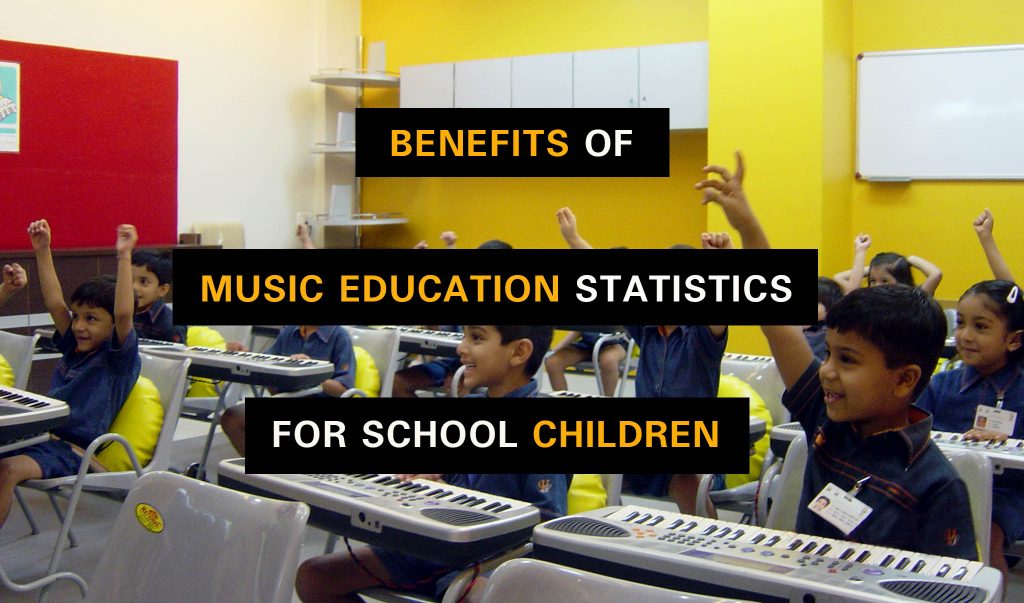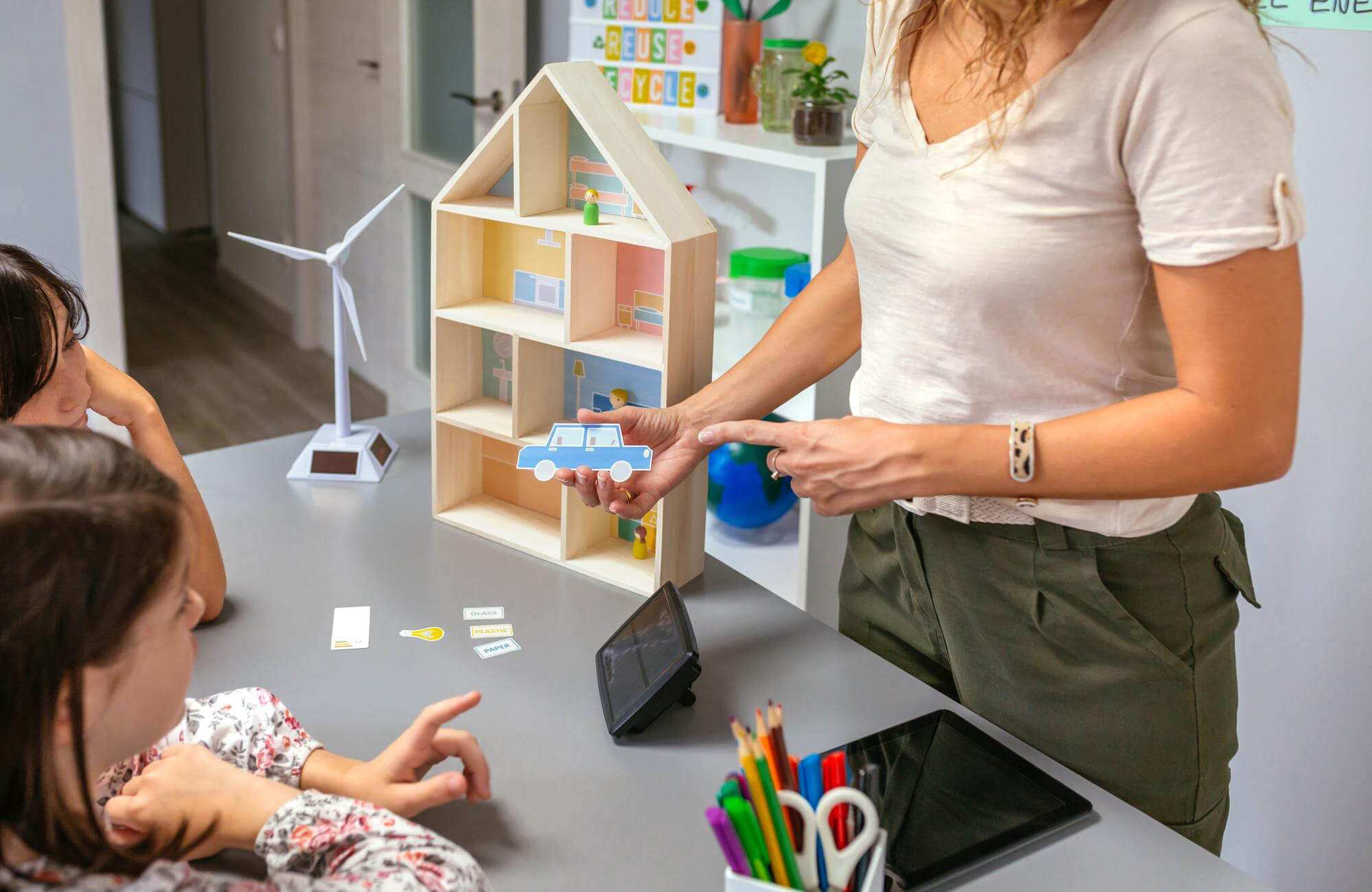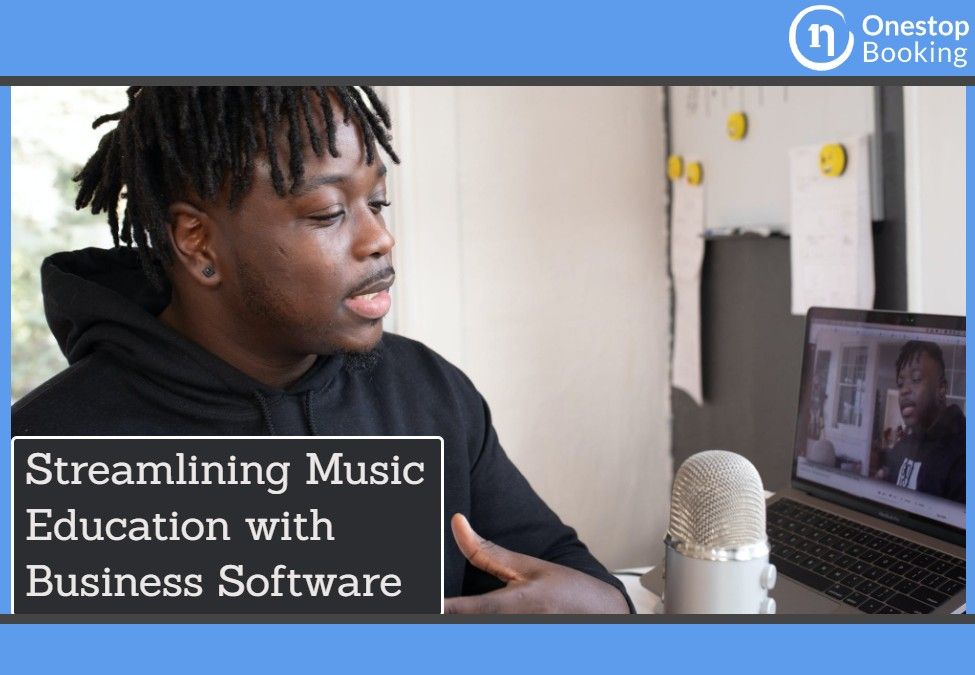The value of arts and music is evident both in the private and public sectors. Learning music and playing a musical instrument is not only vital to college students, graduates, and adults, it’s also crucial to young children such as a 10 year-old.
And what a lot of people don’t realize is the impact of arts education, particularly music, in their development in the earlier stages of life.
In fact, when school districts are cash struck, one of the first things they suspend are music lessons. It’s a widespread problem in school districts around the world despite numerous studies showing the benefits of music education.
What Is Music Education Statistics?
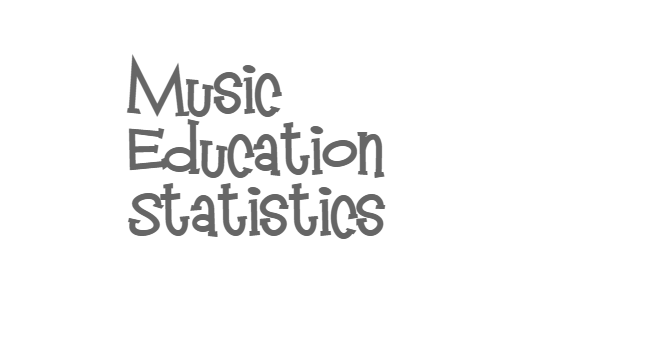
Music education statistics is the data that tells us the kind of impact that music education has on the lives of kids and adults. Making the argument for music education with music education statistics is crucial in advocating for arts and music in schools.
It’s estimated that schools offering music training have an attendance and graduation rate of 94% and 90.2%, respectively, compared to schools that don’t offer music education with an attendance and graduation rate of 85% and 73%, respectively.
Why Is Music Education Important Statistics?
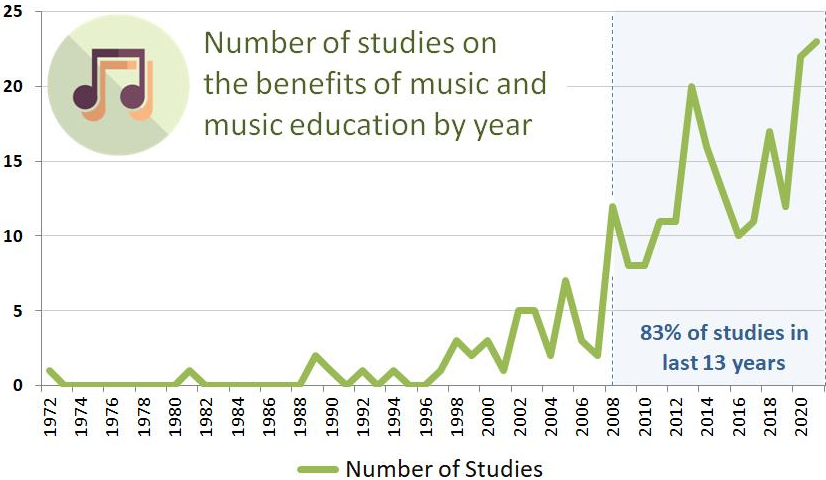
Here are five statistics that prove the importance of music education:
Better Test Scores
A study done by Nature Neuroscience found that students enrolled in music education have higher scores on standardized tests than students who don’t.
Fewer Discipline Issues
A study done by the Northeast Iowa School of Music found that kids enrolled in music programs have fewer discipline issues and interact better with their schoolmates.
Greater Intellectual Benefits
There are multiple intellectual benefits when kids participate in music education, such as having better abstract reasoning and listening skills as well as enhanced memory retention.
Higher Graduation Rates
Schools with music programs have a significantly higher graduation rate than schools without, with the former averaging over 90% while the latter has about 73%.
Improved Ability to Accept Constructive Criticism
A report released by the Wall Street Journal found that kids learning music are open to accepting and giving constructive criticism.
Another study done by the Neighbourhood Music School Connecticut found that kids learning music can turn negative feedback into something positive, helping them build self-confidence.
Does Music Education Affect Students’ Grades?
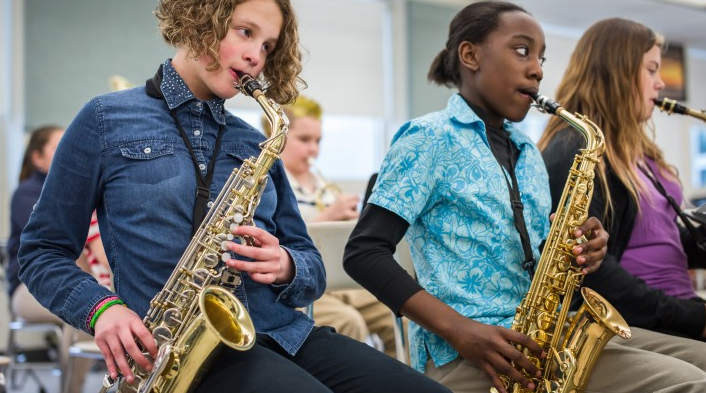
Not only do students who study music education develop artistic abilities, but they also get benefits that spread to other parts of their lives, such as academic achievement. Music education can affect the grades of a student in the following ways:
Advances Mathematics Achievements
Students who learn music outdo non-musicians when it comes to maths assessments, and these benefits grow over time. These stats are the same regardless of the social-economic status of the child or their racial background.
Not only that, kids who study instrumental music are better in algebra which becomes a gateway for more opportunities in the future.
Improves Reading and ELA (English language arts) Skills
Students who learn music are better than non-musicians when it comes to writing assessments, proofreading, reading, and responding.
Improves The Retention of Information
Musical training develops the part of the brain in charge of verbal memory, that is, the remembrance and retention of spoken word. In fact, this is the basis of students remembering what they learned in academic subjects.
Music students who’ve undergone testing for verbal memory have a superior recollection of words compared to students who don’t learn music.
15 Benefits of Music Education Statistics for School Children
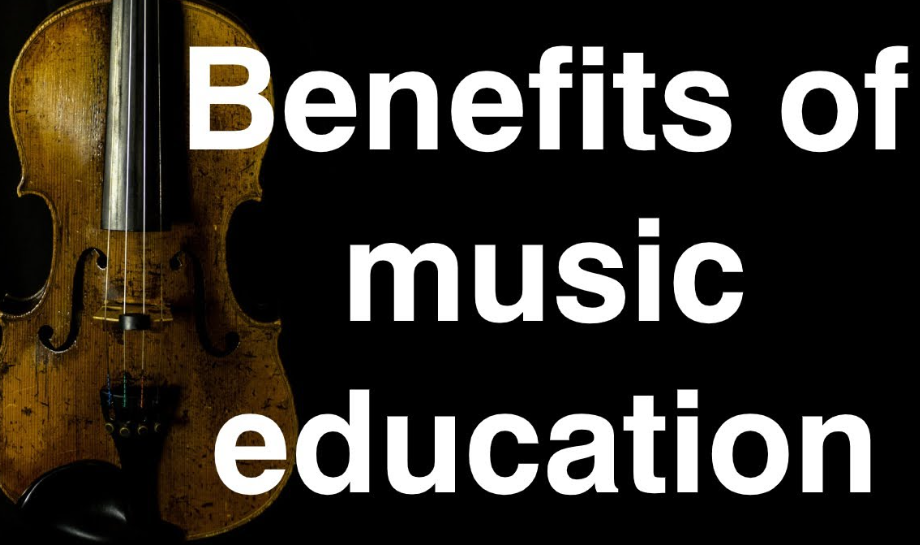
Many learning systems are focused on imposing the set standards to ensure students excel in standardized tests and acquire vital skills. The acquisition of education and skills is meant to help them land job opportunities in the future.
Amidst this quest of inculcating academics, a lot of creative learning programs such as arts and music are considered irrelevant and even removed from curriculums.
But there is one thing that learning institutions seem to forget or don’t know, music and arts can have a massive impact on a child’s growth and development.
Let’s look at the benefits of music education statistics for music children and their impact on the preparedness of kids for their future career aspirations.
Music Statistics Show the Impact Music Has On the Brain Development of Kids
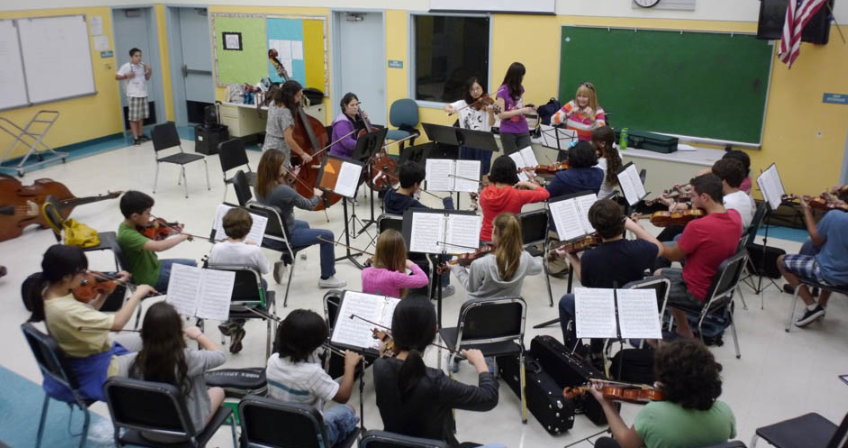
Various studies have established that music instruction can boost the brain development of young kids. A study done by North-western University found that kids who play musical instruments had superior neural processing than those who didn’t.
This study proves one of the benefits of kids learning music in schools as well as learning how to play various musical instruments.
Music Statistics Reveal How Music Connects People
Music education creates a means for kids to connect with fellow kids and even adults. Remember, kids are very social, and their parents and teachers can encourage them to build relationships by exposing them to their personal experiences.
When there is team work among people of various ages to play musical instruments and listen to tracks, it helps them establish solid bonds.
Music Statistics Show the Impact of Music On Kids’ Discipline
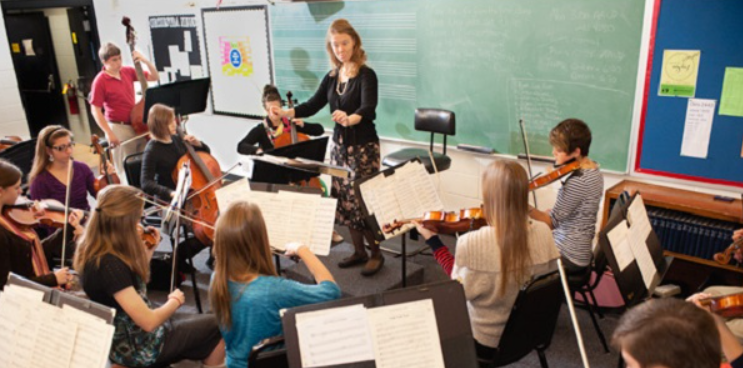
Music is vital in instilling discipline in kids. How? By helping them with how they manage their time. For instance, students who learn music are sometimes obligated to learn and practice music instruments after classes or outside school.
If this is the case, the kids will create and follow a practice schedule. Not only that, they will be expected to strike a balance in their academics, music, and personal lives.
Music Statistics Show the Impact of Music On Stress
Music participation can help relieve stress which is common among students who often get overcome by trying to balance their academic achievement and extracurricular activities.
As students scale the heights of education, they start thinking about college board applications as a result, they often feel overcome by the need to keep good grades.
Music Statistics Reveal the Effect of Music on Cognitive Development
Music instruction has a positive impact on cognitive abilities. Studies suggest that students who study music have demonstrated signs of improved fine motor skills and sound distinction. Brain imaging showed changes in their brain networks which is allied to music.
Music Statistics Show the Benefits Music Extends to Different Outcomes
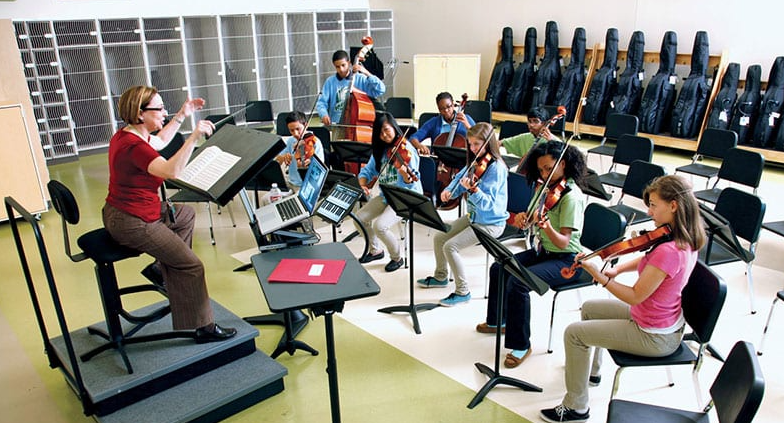
Studies show the benefits of music go beyond various outcomes. These studies have proven that kids who take art-related subjects express themselves better and are more self-confident. Various other studies indicate dropouts are low in schools offering art-related subjects.
Music Statistics Show the Impact of Music On Test Scores
As per a report by SpreadMusicNow, a music group that strives to help non-profit music education programs, there is an improvement in the academic performance of students who participate in music education at different elementary school levels.
Music Statistics Show Higher Attendance Rate in Schools That Teach Music
According to the NAMM, schools that offer musical have a turnout rate of over 90% compared to slightly under 85% in non-music schools. The difference might seem small, but it isn’t considering the total number of kids in a school district.
Music Statistics Reveal Advanced Reading Skills in Kids Who Study Music
Kids who partake in music study often have high-quality reading skills and more vocabulary than their colleagues who don’t take music classes.
Music Statistics Reveal Lower Drug Use in Kids Who’ve Studied Music
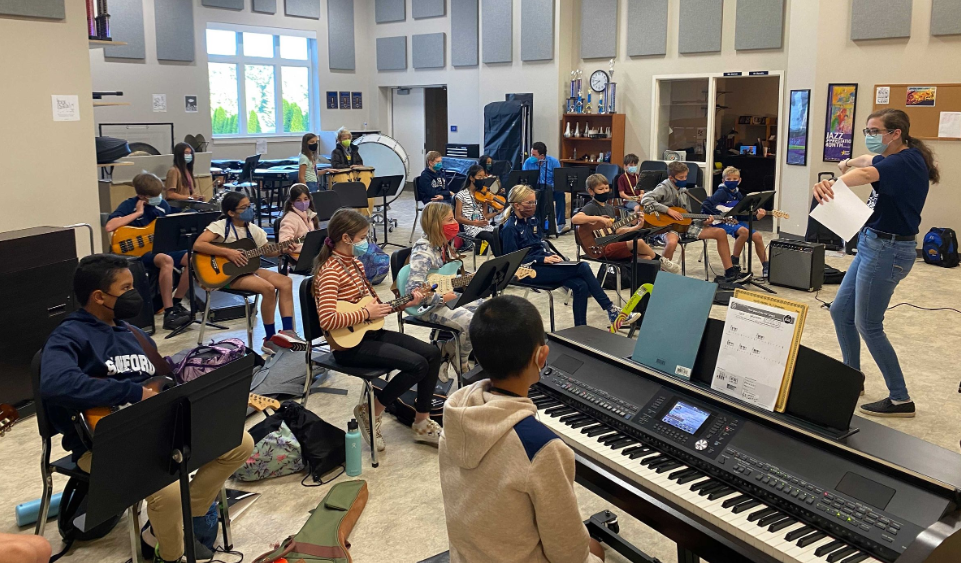
According to one study, high school students with musical experience had the lowest lifetime and current abuse of drugs, including alcohol, cigarettes, and illicits such as cocaine.
Music Statistics Reveal Emotion Stability in Kids Taking Music
Music students are more emotionally stable due to their confidence from making music or winning musical competitions. Musical students are also empathetic towards other cultures due to the incorporation of different cultures in music.
Music Statistics Reveal Learning Music Improves Spatial Task Performance
Music study and listening to music can boost spatial reasoning performance. But what is it? Special reasoning performance is a critical higher-brain function necessary to execute complex tasks such as arithmetic problem solving.
Music Statistics Show Have a Better Attention Span
Music students have a better attention span than non-music students. Why? Because music students decode musical notations and translate them into precise modern patterns
Understanding fractions and ratios, for instance, a quarter note is half the size of a half note, and concentrating on that for long periods builds attention span.
Music Statistics Show Students Learning Music Are More Social
Music students score significantly higher than their non-music peers when it comes to social capital, including interacting more with their teachers and guardians.
Music Statistics Show Music Boosts Self Esteem
Several studies have shown that school music programs help kids feel less alienated, promote individual growth and establish a common bond between the home and school environments. This helps boost the self-esteem of kids taking music.
Final Thought
To sum it all up, musical statistics show the benefits of learning music for kids of all ages. Therefore, schools should do all it takes to continue advocating for music lessons. On the other hand, parents should encourage their kids to enroll in music lessons.


